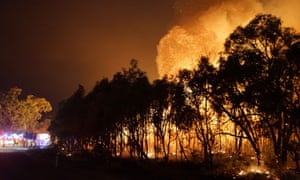Major parties must recognise ‘national firefighting assets’ are needed to fight worsening natural disasters, say fire experts
More than 20 former fire and emergency chiefs from multiple states
and territories say Australia is unprepared for worsening natural
disasters from climate change and governments are putting lives at risk.
In a statement issued before a federal election date is announced, 24 former emergency services leaders and senior personnel have called on both major parties to recognise the need for “national firefighting assets”, including large aircraft, to deal with the scale of the threat.
The signatories include: Greg Mullins, the second-longest serving fire and rescue commissioner in New South Wales and now a councillor with the Climate Council; Neil Bibby, a former chief executive of Victoria’s Country Fire Authority; Phil Koperberg, a former NSW rural fire service commissioner and former Labor MP and NSW environment minister.
The document calls on the next prime minister to meet former emergency service leaders “who will outline, unconstrained by their former employers, how climate change risks are rapidly escalating”.
The group also wants the next government to commit to an inquiry into
whether Australia’s emergency services are adequately resourced to deal
with increased risks from natural disasters caused by climate change.In a statement issued before a federal election date is announced, 24 former emergency services leaders and senior personnel have called on both major parties to recognise the need for “national firefighting assets”, including large aircraft, to deal with the scale of the threat.
The signatories include: Greg Mullins, the second-longest serving fire and rescue commissioner in New South Wales and now a councillor with the Climate Council; Neil Bibby, a former chief executive of Victoria’s Country Fire Authority; Phil Koperberg, a former NSW rural fire service commissioner and former Labor MP and NSW environment minister.
The document calls on the next prime minister to meet former emergency service leaders “who will outline, unconstrained by their former employers, how climate change risks are rapidly escalating”.
They said some large firefighting aircraft were prohibitively expensive for states and territories and leased from the northern hemisphere, and access to them was becoming more restricted as fire seasons started to overlap.
“I started firefighting in 1971 and the bushfire seasons were extremely predictable,” Mullins said. “They’d start in Queensland and move south progressively.
“You knew when there was a bad season coming because there was an El Nino and drought. In the 90s, I stopped being able to predict it.”
Australia’s emergency resources were still equipped for “what was happening in the 1970s to the 1990s”.
“The first thing is we need whoever is in government nationally to take climate change seriously, rather than making jokes about it in parliament with lumps of coal,” he said.
“It’s just frustrating to hear the lip service being given to ‘Oh yes, we now believe in climate change and need to do something’ when every effort to do something about it is rubbished.”
Last year, in Australia alone, the NSW fire season began in early August, a heatwave led to fires in rainforest areas of Queensland in early December, and forest in Tasmania’s world heritage area caught fire in January, Australia’s hottest month on record.
For the past week the government has been running attacks on Labor’s proposal for electric vehicle targets to reduce carbon emissions.
“You look at any of your headlines over the last six months,” Bibby said. “The hottest month. The hottest summer.
“We know the problem, and the only way to get politicians to do something about these things is put their jobs on the line.”
Bibby said an additional concern was that Australia relied so heavily on volunteers during natural disasters.
As extreme weather becomes more frequent, and fire seasons longer, that would put strain on the system and volunteers helping their communities were at risk of burnout.
There needed to be a review of the methods used to tackle large fires, cyclones and floods that was backed by research from experienced people working on the ground.
“We’re doing the same old things when things are getting worse. We need to find new ways to tackle this problem,” Bibby said.

No comments:
Post a Comment